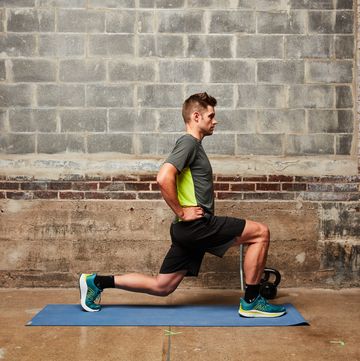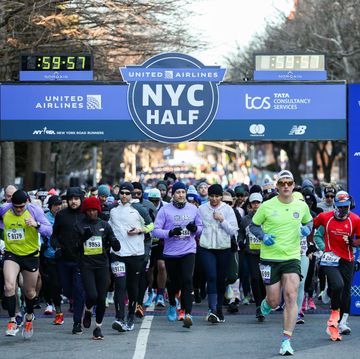I am 69 and started walking about one month ago because I have gained weight. I am 5' 9" and weigh 170 pounds. I walk from 2.5 to 3.5 miles in about one hour, four times a week. I have tried to run a little but can't run more than two minutes at a time. I have kept trying and trying to extend my running time, to no avail. Please tell me what is wrong with me. Why can't I run like everybody else does? - Judy
Dear Judy-
First, before beginning any exercise program it is always best to consult with your physician and undergo a complete physical just to rule out any underlying health conditions. I encourage you to make an appointment with your health care professional, if you have not done so already. Now, that said, walking 3.5 miles in one hour, four times a week, within a one month period, is a significant accomplishment! In fact, you may be pushing yourself too hard! Patience, Grasshopper!
Your month of walking has given you a great base of conditioning. Keep your walking going, and then, to begin running, try adding some very small increments of run time interspersed throughout your walking routine. For example, warm up first by walking for several minutes. Then, run at an easy pace for just 30 seconds, then walk for 2 to 3 minutes. Add another short run interval of 30 seconds after you feel recovered. Repeat this run/walk sequence throughout your exercise session. Play with the time intervals for both the run and the walk portions based on how you feel; however, starting with very short run intervals and longer walk intervals is the way to begin. Gradually increase the length of the run intervals by small increments of time over a period of several months. Most likely, during this process you will find a run/walk interval you feel comfortable with and enjoy using.
Also, watch your run pace. Often when new runners find they cannot maintain a run, it's because they are running too fast. If you find you cannot maintain your run pace, slow down, return to walking and recover. Once recovered, try running again at a slower pace. It's important to note that many runners use a run/walk interval as their training method, so it's not just for beginners. There is no hard and fast rule that states you must run continuously to be "a runner."
Be patient with your progress, as you really have accomplished a great deal already! Our bodies take time to adapt to the demands of exercise, much longer than we realize. As a general rule of thumb, it takes the body about 6 weeks to adapt to the training stimulus. And, the older we are, the longer the adaptation process takes. Your dedication and consistency are impressive.
Monitoring your Resting Heart Rate (RHR) is a good way to follow your training. Take your resting pulse each morning, before getting out of bed, for one minute and record it. As our fitness level improves, our resting pulse declines, so this is an objective way for you to track your progress. After several heart rate readings, you will have your current baseline. When you see your RHR drop, you will know your body is adapting to the training and becoming fitter. When you see a rise in your resting heart rate of 10 beats or more, it's a red flag. Your RHR is letting you know that something is up. A higher-than-normal RHR can indicate an oncoming illness, lack of recovery, not enough sleep, overtraining, stress, dehydration, etc. Whatever the cause, it lets you know you should back off on your workout for that day. You can choose to sleep in, go at an easier pace, or cut a long run short. When your RHR returns to normal, you will know your body is ready for a workout.
Air Max 2017 KPU womens shoes pink!
Susan S. Paul, MS
Editor's note: If you’re a new runner and have a question, please send it to [email protected]. And if you recently emailed a question, please consider sending it again. We had a problem with our email system and missed some recent emails. We’re very sorry, and we hope to hear from you soon. Due to the volume of mail, we regret that we cannot answer every email.

Susan Paul has coached more than 2,000 runners and is an exercise physiologist and program director for the Orlando Track Shack Foundation. For more information, visit www.trackshack.com.












